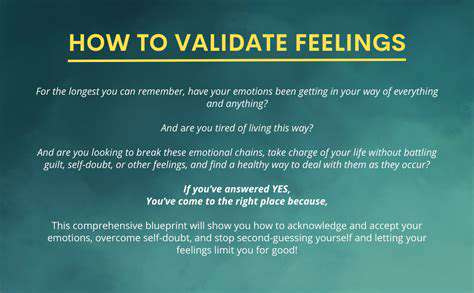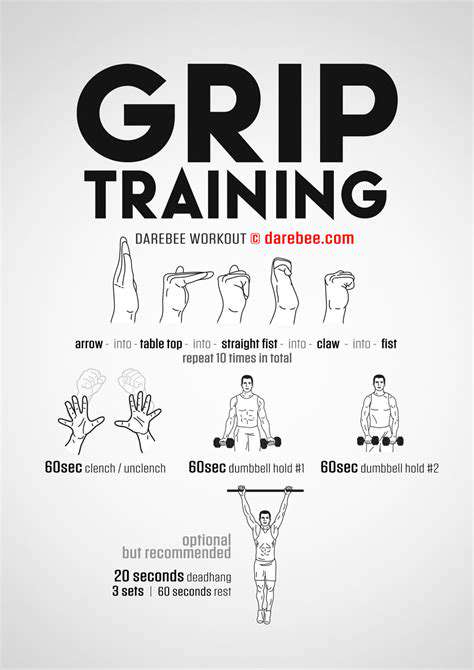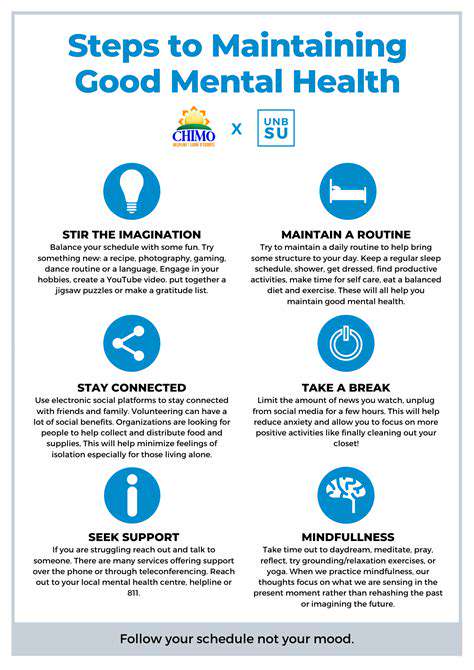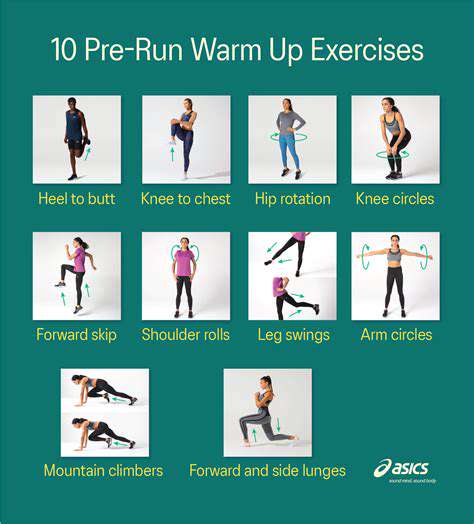How to Deal with Job Loss and Maintain Mental Health
Acknowledge and Validate Your Feelings

Understanding Your Emotions
Acknowledging and validating your feelings is a crucial first step in managing them effectively. It involves recognizing the emotions you're experiencing, whether they're positive or negative, without judgment. This doesn't mean you have to agree with the emotion or allow it to dictate your actions, but rather that you give yourself permission to feel what you're feeling. This process helps you to connect with your inner self and understand the root causes of your emotional responses.
Often, we try to suppress or ignore difficult emotions. However, this can lead to increased stress and anxiety. By acknowledging these emotions, you create space for yourself to process them in a healthy way. This allows you to gain insights into your emotional patterns and develop strategies for managing them in the future.
Identifying the Source of Your Feelings
Once you've acknowledged your feelings, the next step is to identify the source. What triggered this emotional response? Was it a specific event, a relationship dynamic, or a recurring thought pattern? Understanding the source can provide valuable insight into the underlying causes of your feelings. Taking the time to identify the trigger helps to develop strategies to address the issue at its core, promoting emotional well-being and personal growth.
By understanding the source of your feelings, you can begin to develop a more nuanced understanding of yourself and your emotional responses. This process enables you to take proactive steps to address the root causes of your emotions, leading to a more balanced and fulfilling emotional life.
Responding with Self-Compassion and Action
Responding to your feelings with self-compassion is vital. Treat yourself with the same kindness and understanding that you would offer a friend experiencing similar emotions. Avoid harsh self-criticism or judgment. Remember that emotions are temporary and that you have the strength and resilience to navigate them. Self-compassion is a powerful tool for managing difficult emotions and promoting emotional well-being.
Once you've acknowledged, identified, and responded with self-compassion, it's important to consider actions you can take to address the situation. This could involve seeking support from a friend, family member, therapist, or other trusted source. Alternatively, you might need to implement coping mechanisms to manage the emotional response. Taking concrete actions based on your understanding helps you regain control and move forward.
Focus on Practical Steps and Self-Care
Understanding the Emotional Impact
Experiencing job loss is a significant life event that often triggers a range of emotional responses, including sadness, anxiety, fear, and even anger. Acknowledging these feelings is the first step toward navigating this challenging period. It's crucial to allow yourself time to process these emotions without judgment. Suppressing these feelings can lead to further emotional distress and complicate the recovery process. Understanding the emotional toll of job loss helps in developing coping mechanisms and seeking support when needed, fostering a more positive and healthy outlook.
Denial, anger, bargaining, depression, and acceptance are common stages of grief. Recognizing these stages can help you understand your reactions and avoid self-criticism. Allowing yourself to experience these emotions fully, without rushing through them, is essential for healing and moving forward. Remember that the grieving process varies from person to person, and there's no right or wrong way to feel. Seeking professional guidance can provide valuable insights and practical strategies for managing these emotions effectively.
Developing a Support System
During times of job loss, building a strong support system is invaluable. Reach out to friends, family, and colleagues who can offer empathy, understanding, and practical assistance. Sharing your feelings and experiences with trusted individuals can provide comfort and perspective. Don't hesitate to utilize support groups, either online or in person, to connect with others facing similar challenges. These groups offer a safe space to share experiences, gain encouragement, and learn from others' coping strategies. This network of support can significantly reduce feelings of isolation and provide a sense of belonging.
Talking to a therapist or counselor can be an invaluable part of building a support system. They can provide a safe and confidential space to process emotions, develop coping mechanisms, and address underlying anxieties related to job loss. Professional guidance can offer personalized strategies for navigating the challenges and foster a sense of empowerment and resilience. A therapist can help you understand your emotional responses and develop strategies for managing stress and anxiety more effectively.
Crafting a Plan for the Future
Job loss can be a catalyst for personal growth and career advancement. Take time to assess your skills, interests, and aspirations. Research different career paths that align with your goals and explore potential opportunities. Consider taking online courses or attending workshops to enhance your skills and gain new knowledge. Networking with professionals in your field can provide valuable insights and connections. Developing a clear plan for the future, whether it's a new career path or furthering your existing skills, can help mitigate feelings of uncertainty and instill a sense of purpose.
Taking stock of your skills and experience is an essential component of planning for the future. Identify transferable skills from your previous role that can be applied in a new position. Highlight these skills in your resume and cover letters. Research industries and roles that align with your skills and interests. This process can help you identify potential opportunities and develop a clear path forward.
Prioritizing Self-Care
Maintaining a healthy lifestyle is crucial during this transition. Prioritize physical and mental well-being by incorporating healthy habits, such as regular exercise, balanced nutrition, and sufficient sleep. Engage in activities that bring you joy and relaxation, such as hobbies, spending time in nature, or pursuing creative endeavors. Taking care of your physical health can significantly impact your mental state and overall well-being. Making time for self-care can reduce stress and help you feel more resilient during this challenging period.
Finding healthy outlets for stress and emotions is paramount. Engage in activities that promote relaxation and mindfulness, such as meditation, yoga, or spending time in nature. These activities can help regulate emotions, reduce anxiety, and promote a sense of calm. Prioritizing self-care is not a luxury but a necessity for navigating job loss and maintaining mental well-being. Creating a daily routine that incorporates self-care practices can help you regain a sense of control and stability.
Explore Opportunities for Growth and Renewal
Identifying Your Strengths and Interests
Navigating job loss can feel overwhelming, but it's an opportunity to gain clarity on your strengths and interests. Reflecting on past successes, both in your previous role and in other areas of your life, can be incredibly helpful. What tasks did you enjoy most? What skills did you excel at? Identifying these key areas will help you understand what you bring to the table and how to leverage those assets in your job search. This introspection goes beyond a simple what I did but delves into what I *enjoyed* doing and what I *am* good at. This self-assessment is crucial for crafting a job search strategy that resonates with your true aspirations.
Beyond your professional skills, consider your personal interests and passions. Do you have hobbies or activities that you find fulfilling? These passions can often translate into valuable skills and experiences that are transferable to potential new roles. Analyzing your interests can help you discover unexpected opportunities for growth and renewal. For example, a passion for photography could lead you to explore roles in graphic design or marketing, even if they're seemingly unrelated to your previous career. By recognizing the connections between your passions and potential careers, you gain a broader perspective on your potential and open yourself to exciting new possibilities.
Developing a Comprehensive Job Search Strategy
A well-structured job search strategy is essential for navigating the often-challenging landscape of unemployment. This involves more than just posting your resume online. It requires a proactive and multifaceted approach that considers various avenues for finding new employment. Researching companies and roles that align with your identified strengths and interests is a critical first step. Actively networking with people in your field, whether through professional organizations, online platforms, or even old contacts, can uncover hidden opportunities and provide valuable insights into the job market. Don't underestimate the power of informational interviews; these conversations can provide invaluable knowledge and potentially lead to direct job openings or valuable mentorship.
Building a strong online presence is also crucial. Updating your LinkedIn profile, creating a professional portfolio, and engaging in relevant online discussions are all effective ways to showcase your skills and experience to potential employers. Tailoring your resume and cover letters to each specific job application is essential to demonstrate your suitability for the role. These tailored documents highlight how your unique skills and experiences directly address the specific needs and requirements of the position, making a powerful statement about your qualifications and fit.
Maintain a Positive Mindset and Perspective

Cultivating a Positive Mindset
Maintaining a positive mindset is crucial for overall well-being and success. A positive outlook allows us to approach challenges with resilience and optimism, fostering a greater sense of personal control and a more fulfilling life experience. It's important to actively cultivate positive thoughts and feelings rather than passively accepting negative ones. This involves consciously choosing to focus on the good in situations and recognizing our strengths and accomplishments.
Developing a positive mindset isn't about ignoring problems, but rather about approaching them with a proactive and solution-oriented attitude. This involves practicing gratitude, focusing on personal growth, and engaging in activities that bring joy and fulfillment.
Recognizing and Addressing Negative Thoughts
Negative thoughts can significantly impact our mood and behavior. Identifying and understanding these patterns is the first step in managing them effectively. Becoming aware of negative thought patterns and the triggers that initiate them can help you develop strategies for counteracting them. This involves recognizing your thought processes and challenging those that are unhelpful or inaccurate.
The Power of Positive Self-Talk
Positive self-talk is a powerful tool for boosting self-esteem and motivation. Replacing negative self-criticism with encouraging and supportive affirmations can significantly improve your self-perception and overall well-being. This practice involves consciously choosing to speak to yourself in a positive, encouraging manner, focusing on your strengths and capabilities.
Effective Strategies for Maintaining Positivity
Implementing effective strategies for maintaining a positive mindset is essential for long-term well-being. This includes practicing mindfulness, engaging in regular physical activity, and nurturing meaningful relationships. Mindfulness can help you stay grounded in the present moment and appreciate the positive aspects of your life. Regular physical activity releases endorphins, which have mood-boosting effects. Nurturing meaningful relationships provides support and encouragement, contributing to a greater sense of belonging and positivity.
The Impact of Positivity on Productivity and Performance
A positive mindset can significantly enhance productivity and performance in various aspects of life. When you approach tasks with optimism and resilience, you're more likely to overcome challenges and achieve your goals. This positive energy translates into increased motivation and focus, leading to better outcomes. It also fosters a more creative and innovative approach to problem-solving.
Building Resilience Through Positive Thinking
Resilience is the ability to bounce back from adversity. A positive mindset plays a critical role in building resilience. By focusing on your strengths, developing coping mechanisms, and maintaining a hopeful outlook, you can navigate difficult situations with greater ease. Cultivating resilience through positive thinking empowers you to view setbacks as opportunities for growth and learning. This fosters a stronger sense of personal agency and helps you to adapt and thrive in the face of challenges.
Read more about How to Deal with Job Loss and Maintain Mental Health
Hot Recommendations
-
*Guide to Managing Gout Through Diet
-
*Best Habits for Financial Well being
-
*How to Build a Routine for Better Mental Health
-
*How to Eat Healthy on a Budget [Tips & Meal Ideas]
-
*Guide to Practicing Self Acceptance
-
*How to Incorporate More Movement Into Your Day
-
*Guide to Managing Chronic Pain Naturally
-
*Guide to Building a Reading Habit for Well being
-
*Top 5 Weight Loss Supplements That Actually Work
-
*Best Exercises for Postpartum Recovery [Beyond Abdominal Work]










